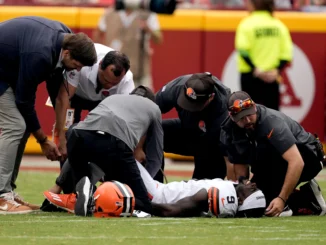
Frank Ryan, a former Browns legend, passed away at the age of 87.
At the age of 87, former Browns quarterback Frank Ryan passed away.
On New Year’s Day, Ryan’s family informed others of his passing. He had spent a considerable amount of his life battling Alzheimer’s illness.
After being transferred to Cleveland in 1962, Ryan was a member of the Browns for seven years. Originally recruited to cover starting quarterback Jim Ninowski, he took over as the starter following Ninowski’s 1962 season-ending injury.
Throughout the 1963 season, Ryan was the Browns’ starting quarterback. He passed for 2,026 yards and 25 touchdowns while helping the team to a 10-4 record. Then, after defeating the Baltimore Colts in 1964, Ryan guided the Browns to their fourth NFL title in team history.
27–0.
Ryan completed his seven-year career with a 52–22 record, 13,361 yards of passing for 134 touchdowns and 88 interceptions. Additionally, in 1964, he was the final quarterback to lead the Browns to their most recent NFL championship. He led the NFL in throwing touchdowns in 1964 and was a three-time Pro Bowl player from 1964 to 1966.
The following was provided by Ryan’s family:
Frank Ryan, a legendary member of the Cleveland Browns and an NFL quarterback, sadly went away from Alzheimer’s disease.
The development of the illness is thought to have been aided by chronic traumatic encephalopathy (CTE). From 1958 until 1970, Frank participated in 13 seasons in the National Football League. He helped the Browns win their final NFL Championship in 1964. completing three touchdown passes as the Baltimore Colts were defeated 27-0. Inducted as a Cleveland Browns Legend in 2005, he was chosen for three NFL Pro Bowls between 1964 and 1966. During his career, Frank also played for the Washington Redskins and the Los Angeles Rams. In addition to racking up numerous outstanding team wins and career statistics as a quarterback, Frank graduated from Rice University in 1965 with a PhD in mathematics, which would help him in his future endeavors outside of the NFL.
Frank led the creation of the first computerized voting system utilized by the US Congress during his seven years as the Director of House Information Systems for the US House of Representatives, following his retirement from professional football in 1970. Frank served as Yale University’s athletic director for ten years after being appointed to the position in 1977. Frank worked as a Vice President for Institutional Planning at Rice University, his alma mater, following his time at Yale. Frank also taught mathematics at the undergraduate and graduate levels throughout his long career, first at Case Western Reserve, then at Yale, and finally at Rice. After retiring to Vermont, Frank carried on his lifetime research of the greatest unsolved mathematical puzzles.
Frank gave same weight, if not greater weight, to
scholastic success as much as he did athletic success, and in later life, he strongly cautioned people closest to him about the risks of football-related injuries, including concussions. Frank has donated his brain to the Boston University CTE Center, following in the footsteps of many of his teammates and friends, in an effort to raise awareness of the effects of recurrent brain trauma on the human nervous system among future football players, their families, and the general public.
Frank was asked to sign thousands of autographs by admirers from all around the nation, regardless of their age or background. He treasured every fan letter he got and showed how much he respected his supporters. Frank responded to every single request for an autograph, up until he stopped being able to do so physically.
Earlier this year, Frank and his spouse Joan celebrated their 65th wedding anniversary. Frank was surrounded by a big, loving family that brought him joy and happiness throughout his life and was there for him when he passed away.




Be the first to comment